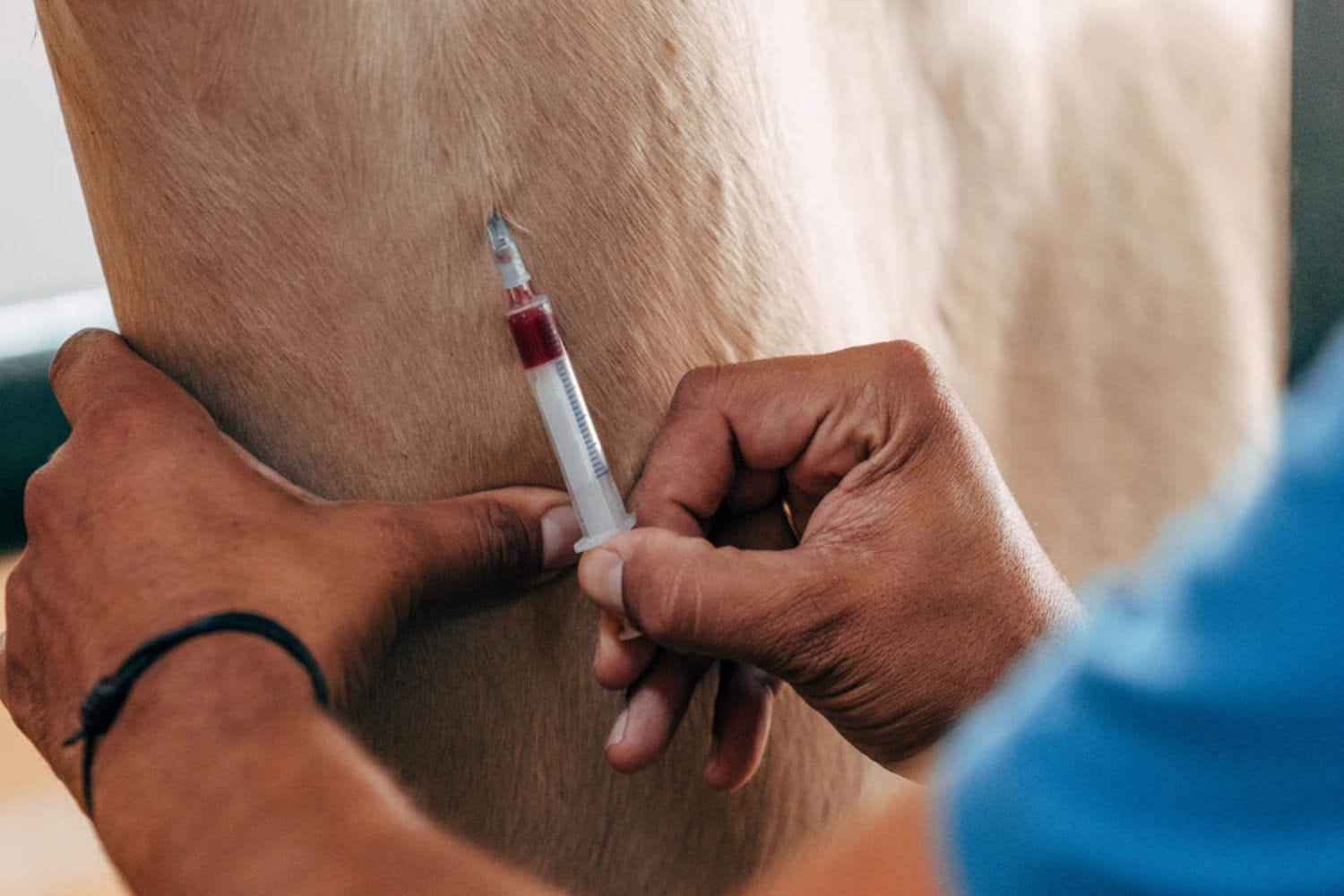Equine researchers are paying more attention to systemic (bodywide) inflammation in horses and its impact on their GI tract health and performance. Why? Systemic inflammation affects the entire body and can contribute to various health problems, including muscle and bone injuries, equine metabolic syndrome, insulin resistance and laminitis.
Research has revealed a strong link between systemic inflammation and gi tract health in horses. Intestinal diseases related to inflammation, such as leaky gut syndrome, can lead to chronic inflammation and other metabolic and musculoskeletal problems that will wreak havoc on your horse’s health and performance.
Understanding how the gut, immune system and endocrine system are connected can help you manage your horses well by supporting optimal wellness and athletic ability from the inside out.
How Inflammation Affects Your Horse’s Entire Body
You are probably already a bit familiar with how localized inflammation works in regards to swelling in limbs and around wounds. But inflammation can also affect the whole body.
Inflammation is a normal part of the body’s defense mechanisms. The immune system initiates a response necessary for horses to recover from infection or injury. (MacKay, 2000) But if this normal response becomes amplified, a reaction occurs throughout the entire body that can become chronic. (McConachie et al., 2015)
Body systems affected by systemic inflammation include:
- Gastrointestinal tract
- Immune system
- Endocrine system
- Musculoskeletal system
Systemic inflammation in these body systems can contribute to multiple diseases. Disorders related to bodywide inflammation include:
- Leaky gut syndrome
- Equine metabolic syndrome
- Laminitis
- Musculoskeletal injuries
Horses with chronic, systemic inflammation often struggle with many health issues. When horses don’t feel their best, they can’t perform at their best. Therefore, managing inflammation is critical for your performance horses.
The Connection Between Immune and Gut Health in Horses
Gut health in horses is closely linked to the immune system responsible for triggering inflammation. Pathogens that cause illness and disease can easily enter the horse’s body through digestion and the gut. As a result, the majority of a horse’s immune system is housed in the gut.
The gut microbiota plays a key role in a horse’s immune health. Beneficial microbes compete with harmful pathogens that enter the digestive tract and prevent them from causing an infection. Imbalances in the microbiota, then, can allow pathogens to proliferate and trigger an immune response that then increases inflammation. (Kauter et al., 2019)
It’s pretty well-known that the body’s stress response reduces immune function, as it moves energy to other systems instead to facilitate flight or fight. Read more about how stress affects the horse’s gut and immune system here.
Performance horses are frequently exposed to stressful situations including training, hauling, new environments, new horses, changing routines, and competition to name a few. As a result, they’re chronically subjected to elevated levels of the stress hormone cortisol, which affects both immune and gi tract health. The longer these stress hormones stick around, the more they can increase leaky gut and immune dysfunction, which can further increase inflammation. (McGilloway et al., 2022)
The Horse’s Endocrine System
Energy sources (feed and forage) are absorbed in the gut and can disrupt the endocrine system if unused or stored incorrectly. Endocrine dysfunction is also strongly linked to systemic inflammation.
Sugars are digested in the small intestine and absorbed into the bloodstream as glucose. High glucose levels stimulate the endocrine system to release insulin, facilitating glucose uptake in body tissues. But large fluctuations in blood sugar levels and inflammation can lead to insulin resistance. (Kronfeld et al., 2005) When this is caused by systemic inflammation, it can lead to equine metabolic syndrome.
The Connection Between Diet and Inflammation in Horses
High-starch diets and large meals can overwhelm your horse’s digestive tract and ability to digest carbohydrates properly in the foregut. This allows glucose (sugar) to reach the hindgut where lactic acid is then produced, upsetting the normal acidity of the gut. Increased lactic acid leads to hindgut acidosis, which kills beneficial gut bacteria. (Richards et al., 2006) As this process plays out, dying bacteria release pathogens, which leak out through gut, and then lead to problems throughout the body (see Leaky Gut Syndrome described in the next section).
A balanced hindgut relies on a constant fiber supply from forage to thrive. It’s also critical that simple-carbohydrates from grains be fully digested in the foregut, where they belong. Feeding a low-starch, forage-based diet supports healthy digestion, maintaining the hindgut’s balance and preventing good bacteria from dying off and causing inflammation (Kauter et al., 2019)
Leaky Gut Syndrome in Horses
Your horse’s intestinal lining has a single layer of cells that act as a barrier to prevent bacteria and toxins from entering the bloodstream. In healthy horses, these cells increase rapidly to repair and maintain the strength of the intestinal lining.
When the intestinal lining is compromised as a result of imbalances and acidosis, leaky gut syndrome occurs, allowing toxins and pathogens to leak into the bloodstream. This triggers an aggressive immune response throughout the entire body. This bodywide inflammation can lead to an allergic reaction, poor joint health, insulin resistance, and laminitis. (Stewart et al., 2017)
Leaky gut is a component of a broader gi tract health issue such as hindgut acidosis or microbial imbalance. Horses with leaky gut have poor digestive function and may struggle with:
- Weight loss
- Free fecal water syndrome
- Diarrhea
- Colic
- Behavioral issues
- Poor performance (Stewart et al., 2017)
Performance Contributes To and is Affected by Inflammation
Research shows transport and exercise can contribute to systemic inflammation and leaky gut syndrome in performance horses. One study found a significant increase in intestinal permeability (leaky gut) in horses after just one hour of trailer transport and 30 minutes of moderate exercise. (McGilloway et al., 2022)
Alos, long-term use of medications to manage performance horses can increase the chance of developing a leaky gut. Use of NSIADs have long been correlated with right dorsal colitis in horses, a fancy phrase for inflammation in the large colon. Many owners administer omeprazole with NSAIDs to mitigate the risks of gastric ulceration associated with the medication, but some studies show that proton pump inhibitors like omeprazole can exacerbate intestinal damage. (Whitfield-Cargile et al., 2021)
These correlations suggest competition horses may have an increased risk of leaky gut syndrome.This can affect your horse’s health and performance in multiple ways:
- Horses with leaky guts can’t absorb the calories and nutrients they need from their diet to support their best performance.
- Bodywide inflammation can also contribute to joint problems and increase the risk of injuries to muscles and bones in athletic horses.
- Other inflammatory-induced conditions such as laminitis can be life-threatening and career-ending. (Leise et al., 2021)
How to Fight Systemic Inflammation in Horses
Change Up Your Management Program
In order to reduce the risk of inflammation in your horses, your management program should focus on practices that reduce stress and other contributors to chronic inflammation throughout the body. These good husbandry practices will help with the inflammation issue and a lot more:
- Decreasing grain
- Offering free access to forage
- Increasing turnout
- Maintaining consistent routines
- Keeping with consistent buddies
Provide Nutritional Support
Performance horses subject to extra stress from competition, limited turnout and high-energy diets could benefit from natural, targeted digestive support.
- Yeast: keeps the hindgut balanced, feeds beneficial bacteria in the gut, and supports a healthy gut lining.
- Beta glucan: supports immune health, maintains a healthy rate of digestion, removes harmful pathogens, and reduces LDL cholesterol.
- Polar lipids: assist nutrient absorption, the strength and integrity of the mucosal barrier, and normal brain function.
- Amino acids: contribute to a smoothly functioning GI tract and assist metabolism, mucus production, cell repair, and more.
By supporting gi tract health via natural, nutritional supplementation, you can combat inflammation and help your horses look, feel and act their best.
References
- MacKay, R. Inflammation in Horses. Vet Clinics North Am Equine Pract. 2000.
- McConachie, E. et al. Inflammation, Endotoxemia and Systemic Inflammatory Response Syndrome. Equine Clinical Immunol. 2015.
- Kauter, A. et al. The gut microbiome of horses: current research on equine enteral microbiota and future perspectives. Anim Microbiome. 2019.
- McGilloway, M. et al. The combination of trailer transport and exercise increases gastrointestinal permeability and markers of systemic inflammation in horses. Equine Vet J. 2022.
- Kronfeld, D. et al. Insulin resistance in the horse: Definition, detection, and dietetics. J Anim Sci. 2005.
- Bertin, F. et al. Insulin dysregulation in horses with systemic inflammatory response syndrome. J Vet Intern Med. 2018.
- Richards, N. et al. The effect of current grain feeding practices on hindgut starch fermentation and acidosis in the Australian racing Thoroughbred. Austral Vet J. 2006.
- Stewart, A. et al. Alterations in Intestinal Permeability: The Role of the “Leaky Gut” in Health and Disease. J Equine Vet Sci. 2017.
- Whitfield-Cargile, C. et al. Effects of phenylbutazone alone or in combination with a nutritional therapeutic on gastric ulcers, intestinal permeability, and fecal microbiota in horses. J Vet Intern Med. 2021.
- Leise, B. et al. Laminitis Updates: Sepsis/Systemic Inflammatory Response Syndrome-Associated Laminitis. Vet Clin North Am Equine Pract. 2021.




